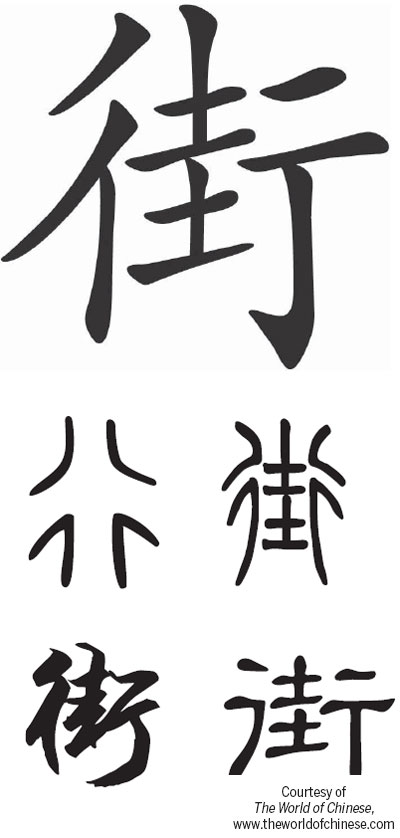On the character | Street
Updated: 2011-11-18 07:44
By Lao Huang and Xiao Chu (黄伟嘉,储丹丹), Revised by Huang Dekuan (黄德宽) (China Daily)
|
|||||||||

Streets are made for more than just walking
"街",并不仅仅是用来逛的。
Streets have long been the place where young folks gathered to hang out, shoot the breeze, play games or steal kisses - which means the streets are also where everything we love about youth culture, like fashion, slang, skating and dance moves, was born. So it seemed only fitting that, for our youth issue, we should take a look at 街 (jiē), the character for street.
Like a lot of characters, 街 is made up of an "idea" radical, 行, and a "sound" radical, 圭. You might already know that 行 (xíng) means "to go" or "to walk", which, of course, is what you do on the street when you're not playing games or stealing kisses. The character isn't designed to look like someone walking, but is descended from its original oracle bone script, in which 行 appears as a four-way intersection. However, you may be scratching your head with 圭 (guī), which doesn't sound anything like 街.
The answer? Evolution! Over hundreds and hundreds of years, the pronunciations of 圭 and 街 naturally diverged. So how does 街 differ from synonyms 道 (dào) and 路 (lù)?
Let's start with the character composition. Like 街, 道 is represented by radicals related to movement. The first radical 辶 (chuò) illustrates the act of walking along a road, while 首 (shǒu), which is drawn to look like someone's head, represents people. In general, characters with 辶 are related to actions involving walking or running, such as "enter" (进 jìn), "deliver" (送 sòng), "escape" (逃 táo) or "chase" (追 zhuī).
路, on the other hand, contains the phonetic aid 各 (gě), though like 圭, the sound has changed over time, and these days it serves as little more than company for 足 (zú), which means "foot". The enterprising 足 is a handy radical for a host of other characters related to the use of feet, such as "run" (跑 pǎo), "step" (跨 kuà), "jump" (跳 tiào) and "trample" (踩 cǎi).
When it comes to their definitions, 道 and 路 are pretty much the same and can refer to any sort of road, whether it be a busy city street or a dirt path twisting up a mountain. The two words, therefore, are mostly interchangeable, and often appear synonymously in Chinese expressions, such as "道/路不拾遗" (dào/lù bù shí yí), which literally translates as, "No one pockets things left on the road," referring to the Taoist belief that honesty prevails throughout society.
街, on the other hand, is used specifically to describe broader roads (for example, you wouldn't use it to refer to an alley, a trail in a forest or a small neighborhood road). Because these kinds of thoroughfares are often linked with commercial development and social interaction, we find 街 popping up in words like 逛街 (guàngjiē, shopping), 街坊 (jiēfang, neighbors) and 街谈巷议 (jiē tán xiàng yì, street gossip).
Moreover, because urban thoroughfares often serve as a space for gathering and entertainment, 街 has also frequently been used to create new words describing popular trends. For example, the practice of taking pictures of people out on the town, is referred to as "street photo-shooting" (街拍 jiēpāi), while break dancing is called "street dance" (街舞 jiēwǔ).
These days, it seems you can attach 街 to anything to mean it's "hot" - popular phones, for example, are now called "街机" (jiējī), while fashionable bags have become "街包" (jiēbāo). So what's next? Wait till the next fad and we will see ...
- Translated by Caroline Berg (碧琪莲)

Courtesy of The World of Chinese,http://www.theworldofchinese.com/











